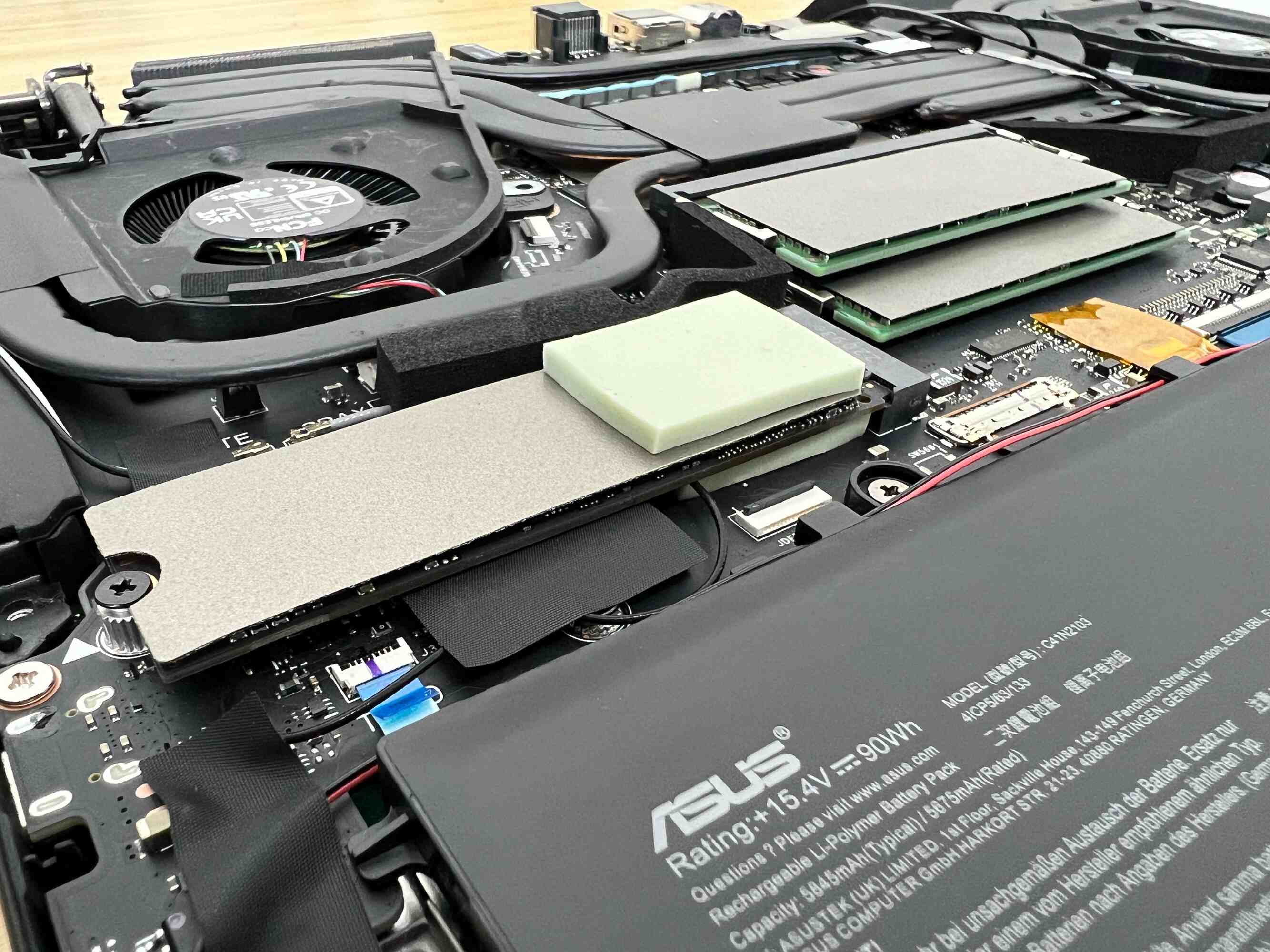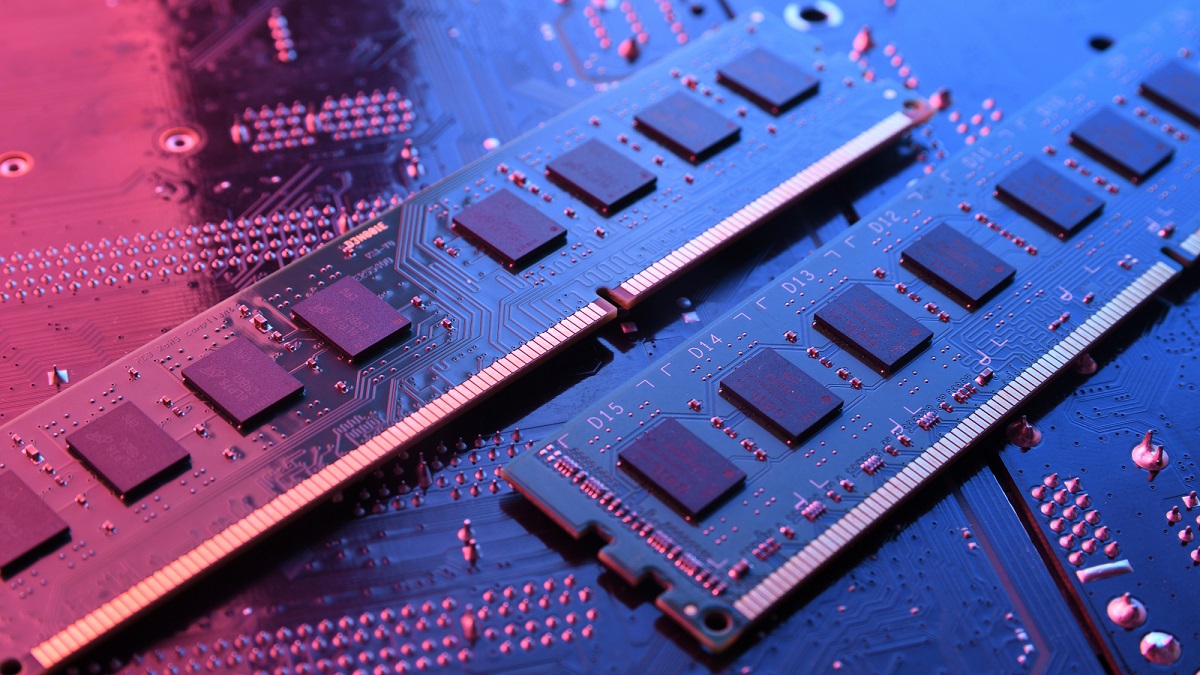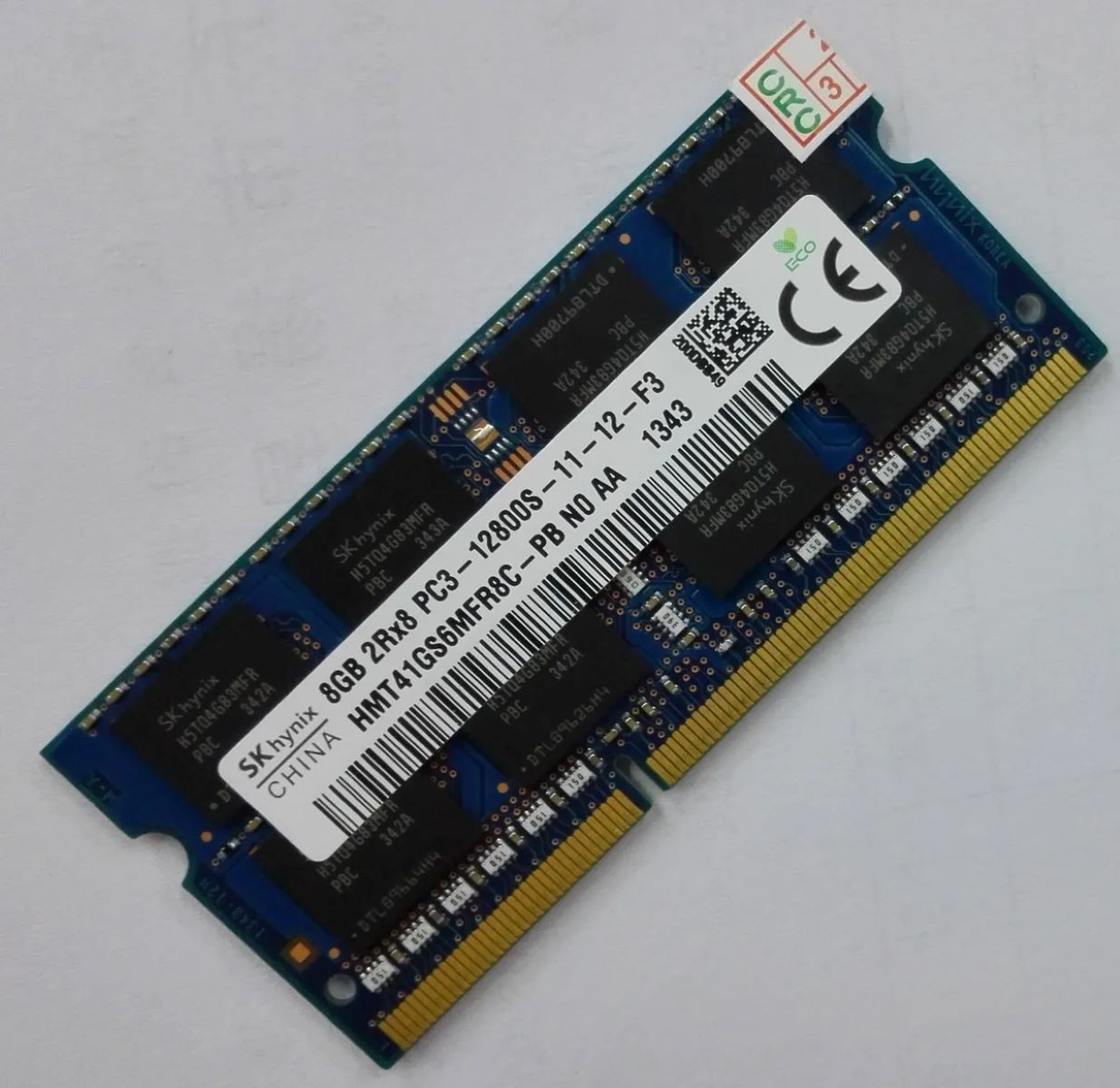What is RAM?
Random Access Memory, commonly known as RAM, is an essential component of a computer’s hardware configuration. It serves as the temporary storage area where data and instructions are held while the computer is running. Unlike the long-term storage of a hard drive or solid-state drive, RAM provides fast and temporary access to data that the computer needs to access quickly.
RAM consists of small memory cells that can be written to and read from in any order, hence the name “random access.” These cells are organized into modules, and each module contains multiple memory chips. The size of the RAM module, often measured in gigabytes (GB), determines how much data it can store at one time.
When you open a program or run a task on your computer, the necessary files and data are loaded into RAM for quick access by the CPU. This enables faster execution of processes, as the computer can quickly retrieve data from RAM instead of having to repeatedly access it from the slower hard drive or solid-state drive.
RAM enables multitasking, allowing your computer to run multiple programs simultaneously without slowing down. Each program that you open takes up a portion of the available RAM, and once it fills up, the computer starts using a portion of the hard drive or solid-state drive as virtual memory. However, accessing virtual memory is significantly slower than accessing data directly from RAM, resulting in reduced performance.
It’s important to note that RAM is a volatile form of memory, meaning that its contents are lost when the computer is powered off or restarted. This is why it’s important to save your work and close programs properly before shutting down your computer.
In summary, RAM plays a crucial role in a computer’s performance, enabling fast data access and efficient multitasking. Without sufficient RAM, your computer may become sluggish and unresponsive, especially when running resource-intensive tasks. Understanding the basics of RAM is essential when considering how much RAM you need for your computer system.
What is the significance of RAM in a computer?
Random Access Memory (RAM) is an integral component of a computer system, playing a significant role in its overall performance and functionality. It serves as a temporary storage space that allows the computer to quickly access and manipulate data while it is running. Understanding the importance of RAM can help you make informed decisions when upgrading or purchasing a computer.
One of the primary functions of RAM is to provide the computer with fast and temporary storage for currently active programs and processes. When you launch a program, its data is loaded into RAM, allowing the CPU to quickly retrieve and process the information. The more RAM available, the more data the computer can keep in active memory, resulting in smoother and more efficient performance.
RAM is particularly crucial for multitasking. If you frequently open multiple programs or run resource-intensive tasks simultaneously, having ample RAM becomes even more important. With sufficient RAM, each program can have enough space to operate without causing performance bottlenecks. On the other hand, insufficient RAM can lead to sluggishness, freezing, and even crashes, as the computer struggles to juggle multiple tasks at once.
In addition to facilitating multitasking, RAM also plays a role in gaming and graphic-intensive applications. Modern games and high-definition video editing software require a significant amount of RAM to store and process large amounts of data. Insufficient RAM can result in choppy gameplay, longer loading times, and hindered graphics performance. Therefore, gamers and professionals working with multimedia content often opt for higher amounts of RAM to ensure an optimal experience.
Furthermore, RAM enhances the overall responsiveness of a computer. When frequently used data is stored in RAM, the computer can access it quickly, reducing the need to fetch information from the slower hard drive or solid-state drive. This results in faster program launches, quick file access, and snappier overall system performance.
It’s important to note that the amount of RAM a computer can support depends on its hardware specifications and operating system limitations. While 8GB of RAM is considered standard for many general-purpose computers, certain applications, such as video editing or virtualization software, may require more substantial amounts of RAM to perform optimally.
In summary, RAM plays a crucial role in a computer’s performance, enabling efficient multitasking, smoother program execution, and faster data access. Having adequate RAM ensures that your computer can handle demanding tasks and applications without compromising its responsiveness. Understanding the significance of RAM allows you to make informed decisions when considering upgrades or purchasing a new computer.
How much is 8GB RAM?
The cost of 8GB RAM can vary depending on several factors, including the brand, type, speed, and warranty of the RAM module. On average, you can expect to pay around $40 to $80 for a reliable and reputable 8GB RAM module.
It’s worth noting that RAM prices can fluctuate over time due to market demand and supply chain factors. High-demand periods, such as new product releases or industry-wide shortages, can temporarily drive up prices. Conversely, prices may decrease during periods of oversupply or when older models become more readily available.
When considering the cost of 8GB RAM, it’s essential to identify your specific requirements and budget. If you are a casual computer user who mainly engages in basic tasks like browsing the internet, word processing, and streaming media, 8GB of RAM should be sufficient. However, if you engage in more resource-intensive activities like gaming, graphic design, or video editing, you may want to consider investing in higher-capacity RAM modules or even doubling the amount to 16GB for optimal performance.
It’s also important to factor in the type and speed of the RAM module. DDR4 RAM is the current standard, offering faster speeds and improved performance compared to older DDR3 modules. Faster RAM modules, such as those with higher frequencies or lower latency timings, may come at a higher price point but can provide a noticeable performance boost in certain applications.
Additionally, the brand and warranty of the RAM module can impact its price. Well-established brands with a reputation for quality, reliability, and compatibility may charge a premium. However, choosing a reputable brand can provide peace of mind knowing that you are purchasing a reliable product backed by warranty and customer support.
Before making a purchase, it’s recommended to shop around and compare prices from different online retailers and computer hardware stores. You may also find deals or discounts during promotional periods or sales events. However, it’s crucial to ensure that you are purchasing from a reputable source to avoid counterfeit or subpar products.
In summary, the price of 8GB RAM can range from $40 to $80, depending on factors like brand, type, speed, and warranty. It’s important to consider your specific requirements and budget when deciding on the amount and type of RAM you need for your computer.
Factors affecting the price of 8GB RAM
The price of 8GB RAM modules can be influenced by various factors, each contributing to the overall cost of the product. Understanding these factors can help you make informed decisions when purchasing RAM for your computer. Here are some key factors that can affect the price of 8GB RAM:
1. Brand: Well-known and reputable brands often command higher prices due to their established track record of quality and reliability. These brands may invest more in research and development, resulting in higher-priced products.
2. Type of RAM: There are different types of RAM, such as DDR3 and DDR4. DDR4 RAM, being the latest standard, generally tends to be pricier than older DDR3 modules due to its improved performance and efficiency.
3. RAM Speed: The speed at which RAM modules operate, measured in megahertz (MHz), can impact the price. Higher-speed RAM modules tend to be more expensive as they offer faster data transfer rates, allowing for improved performance in certain applications.
4. Latency Timings: Latency timings represent the time delay between when a command is given and when a response is received. RAM modules with lower latency timings are typically more expensive since they can deliver faster and more responsive performance.
5. Memory Chip Quality: RAM modules that utilize higher-quality memory chips often come with a higher price tag. These chips are manufactured to stringent standards, ensuring better stability, reliability, and compatibility.
6. Supply and Demand: Like any other product, RAM prices can be influenced by supply and demand dynamics. During periods of high demand or limited supply, prices may increase. Conversely, prices may decrease during periods of oversupply or when newer models are released.
7. Warranty and Customer Support: RAM modules from reputable brands that offer longer warranty periods and reliable customer support tend to be priced higher. The additional cost provides peace of mind, knowing that you can receive assistance in case of any issues or defects with the product.
8. Market Competition: The level of competition among RAM manufacturers and retailers can also affect prices. Higher competition may lead to price reductions or promotions to attract customers, while lower competition may result in relatively stable prices.
It’s important to carefully consider these factors when purchasing 8GB RAM, as they can influence the overall performance, compatibility, and lifespan of your computer system. By understanding the factors affecting the price, you can make an informed decision that meets your budget and specific requirements.
Different types of 8GB RAM available in the market
The market offers a wide range of options when it comes to 8GB RAM modules. Understanding the different types available can help you choose the one that best suits your computer system and specific requirements. Here are some of the common types of 8GB RAM available:
1. DDR3: DDR3 RAM was the previous generation standard and is still used in many older computers. This type of RAM is generally more affordable, but its performance and energy efficiency are not on par with DDR4.
2. DDR4: DDR4 RAM is the current industry standard and offers improved performance and power efficiency compared to DDR3. It operates at higher speeds and allows for better multitasking and faster data transfer rates.
3. DIMM: DIMM (Dual In-Line Memory Module) is the most common form factor for desktop computers. It features a row of pins on each side and requires a dedicated memory slot on the motherboard for installation.
4. SODIMM: SODIMM (Small Outline Dual In-Line Memory Module) is a smaller version of DIMMs and is primarily used in laptops and compact computers. They have fewer pins and a smaller physical footprint, allowing for compatibility with space-constrained systems.
5. ECC: ECC (Error-Correcting Code) RAM is primarily designed for servers and workstations that require maximum data integrity. It can detect and correct certain types of errors, ensuring reliable operation in critical environments. ECC RAM is generally more expensive than non-ECC RAM.
6. Registered vs. Unbuffered: Registered (or buffered) RAM modules have an additional register to help improve signal integrity, allowing for greater stability and support for larger memory capacities. Unbuffered RAM is less expensive and suitable for most consumer-grade systems.
7. RAM Speed: RAM comes in different speed grades, typically measured in megahertz (MHz). Higher speed RAM can offer improved performance, especially in applications that heavily rely on memory bandwidth, such as gaming or video editing.
8. Single vs. Dual Channel: RAM can be installed in a single channel configuration or a dual channel configuration. Dual-channel RAM offers increased memory bandwidth and can improve overall system performance in certain scenarios, although the difference may not be noticeable in everyday computing tasks.
9. Gaming RAM: Some RAM modules are marketed specifically for gamers, featuring flashy heat spreaders or higher speeds for enhanced gaming performance. While these modules may come at a higher price point, they can offer aesthetic appeal and cater to the needs of gaming enthusiasts.
It is important to ensure compatibility with your computer system when selecting the type of 8GB RAM to purchase. Check your motherboard’s specifications and requirements to ensure that the chosen RAM module is supported and will function optimally within your system.
By understanding the different types of 8GB RAM available, you can make an informed decision that meets your specific needs, budget, and performance requirements.
What to consider before purchasing 8GB RAM
Before purchasing 8GB RAM for your computer system, there are several important factors to consider. These considerations will ensure that you select the right RAM module that meets your requirements and is compatible with your system. Here are some key points to keep in mind:
1. Compatibility: Check the specifications of your motherboard to ensure compatibility with the type of RAM you plan to purchase. Consider factors such as form factor (DIMM or SODIMM) and the required RAM speed (DDR3 or DDR4).
2. Capacity: 8GB RAM is generally sufficient for most everyday tasks and typical computer usage. However, if you engage in resource-intensive activities like gaming, graphic design, or video editing, consider opting for higher capacity RAM modules or doubling the amount to 16GB for better performance.
3. Speed: RAM speed, measured in megahertz (MHz), can impact overall system performance. Higher RAM speeds can offer improved performance, especially for memory-intensive applications. Consider the speed requirements of your specific tasks when choosing the RAM module.
4. Latency Timings: Latency timings represent the delay between commands and responses in RAM. Modules with lower latency timings can deliver faster performance. While this may not make a significant difference in everyday computing, it can be beneficial for tasks that require high memory performance.
5. Brand and Quality: Choose a reputable brand known for producing quality RAM modules. Reliable brands often come with better customer support and warranty coverage, providing peace of mind regarding the product’s reliability and longevity.
6. Budget: Consider your budget when selecting 8GB RAM. Prices can vary depending on various factors such as brand, type, speed, and warranty. It’s crucial to find a balance between your budget and the quality and performance needed for your specific tasks.
7. Future Upgradability: Consider the potential for future RAM upgrades. If you anticipate the need for more RAM in the future, ensure that your motherboard has additional RAM slots available to accommodate future expansion.
8. Warranty: Check the warranty period and terms provided by the manufacturer. A longer warranty period can provide added assurance in case of any manufacturing defects or issues with the RAM module.
9. Reviews and Recommendations: Read reviews and seek recommendations from trusted sources or experienced individuals. Reviews can offer insights into the performance, compatibility, and reliability of specific RAM modules, helping you make a more informed decision.
Considering these factors before purchasing 8GB RAM will ensure that you select the right module for your computer system, providing optimal performance and compatibility. Take the time to research and compare different options to find the best fit for your needs and budget.
Is 8GB RAM sufficient for your needs?
When determining whether 8GB of RAM is sufficient for your needs, several factors should be considered, including your usage habits, the type of tasks you perform, and the requirements of the software applications you use. While 8GB of RAM can meet the needs of many users, it may not be suitable for everyone.
For the average computer user who primarily engages in everyday tasks like web browsing, word processing, email, and multimedia streaming, 8GB of RAM is typically sufficient. These activities do not require a significant amount of memory, and the system should perform smoothly without any noticeable slowdowns or limitations.
However, if your usage extends beyond basic tasks and includes memory-intensive applications, such as video editing, graphic design, 3D rendering, or virtualization, you may benefit from having more than 8GB of RAM. These types of tasks require large amounts of memory to ensure smooth operation and efficient workflow.
Gaming enthusiasts may also find 8GB of RAM to be limiting, particularly for modern games that demand substantial system resources. Many AAA titles recommend or even require higher amounts of RAM to run optimally. To prevent performance issues and ensure an enjoyable gaming experience, consider upgrading to 16GB or more of RAM.
Another factor to consider is multitasking. If you frequently have multiple applications running simultaneously, such as running a web browser with multiple tabs, editing documents, and running music or video playback, more RAM will provide a smoother multitasking experience. With additional RAM, you can switch between applications seamlessly without any noticeable slowdown or impact on performance.
In addition, if you use resource-demanding software or work with large datasets, having more RAM can significantly speed up processing times. Applications like video editing software, CAD programs, or virtual machines benefit from increased memory, allowing for quicker rendering, smoother interactions, and improved overall performance.
Ultimately, the decision on whether 8GB of RAM is sufficient for your needs depends on your specific requirements and usage patterns. Assess the type of tasks you perform regularly, the software you use, and the level of multitasking involved. If you find yourself experiencing slowdowns or if your applications are constantly utilizing high amounts of memory, upgrading to a higher capacity RAM module may be beneficial.
It’s worth considering future needs as well. If you plan to keep your computer for an extended period, the demands of software and applications will likely increase over time. Investing in more RAM upfront can future-proof your system and extend its usability.
Remember, upgrading RAM is often one of the easiest and most cost-effective ways to improve system performance. If you find that 8GB of RAM is no longer sufficient, you can usually upgrade to higher capacities based on your motherboard’s specifications and limitations.
Take the time to assess your specific usage requirements and align them with the capabilities of 8GB of RAM. This will help you determine whether it is sufficient for your needs or if an upgrade is necessary to ensure optimal performance.
Pros and cons of 8GB RAM
8GB of RAM is a common choice for many computer users due to its affordability and ability to handle a wide range of tasks. However, like any technology, it comes with its own pros and cons. Understanding these advantages and disadvantages can help you make an informed decision about whether 8GB of RAM is suitable for your needs.
Pros:
- Cost-effective: Compared to higher capacity RAM modules, 8GB of RAM is generally more affordable, making it an attractive option for budget-conscious users.
- Sufficient for most tasks: For the average computer user who engages in everyday tasks such as web browsing, word processing, and multimedia streaming, 8GB of RAM is typically sufficient. It can handle these tasks smoothly without noticeable performance bottlenecks.
- Decent gaming performance: While not ideal for all modern games, 8GB of RAM can still provide a decent gaming experience for many titles. It allows for smooth gameplay, especially when paired with a capable graphics card.
- Improved multitasking: 8GB of RAM provides adequate room for multitasking, allowing you to have multiple applications open simultaneously without significant performance degradation.
- Future upgradability: Many motherboards support higher RAM capacities, so starting with 8GB gives you the option to upgrade to more RAM in the future as your needs evolve.
Cons:
- Limitations with resource-intensive tasks: 8GB of RAM may not be sufficient for memory-intensive tasks such as video editing, 3D rendering, or virtualization. These applications require larger memory capacities to ensure smooth operation and efficient workflow.
- Possible performance limitations in modern games: Some modern AAA titles recommend or even require more than 8GB of RAM for optimal performance. With 8GB, you may experience limitations in certain memory-intensive games.
- Potential constraints for heavy multitasking: While adequate for light to moderate multitasking, 8GB of RAM may struggle to handle extensive multitasking with numerous resource-demanding applications open at the same time.
- Less potential for future-proofing: Technology evolves quickly, and as software becomes more resource-intensive, the demands on RAM will continue to increase. 8GB may become insufficient for future requirements sooner than higher capacity alternatives.
Consider these pros and cons when evaluating whether 8GB of RAM is suitable for your specific needs. If you primarily engage in everyday tasks, moderate multitasking, and casual gaming, 8GB of RAM should suffice. However, if you work with resource-intensive applications or plan to use your computer for demanding tasks, it might be worth considering higher RAM capacities to ensure optimal performance and future-proofing.
Where to buy 8GB RAM?
There are several options available when it comes to purchasing 8GB RAM for your computer. Here are some popular places where you can buy 8GB RAM:
1. Online Retailers: Online marketplaces and e-commerce websites, such as Amazon, Newegg, and Best Buy, offer a wide selection of 8GB RAM modules from various brands. These platforms often provide user reviews and ratings, making it easier to compare prices and choose the right product.
2. Computer Hardware Stores: Local computer hardware stores specialize in selling computer components and accessories, including RAM. These stores often have knowledgeable staff who can provide guidance and help you find the suitable 8GB RAM module for your specific needs.
3. Manufacturer Websites: Many RAM manufacturers, such as Corsair, Kingston, and Crucial, have their own official websites where you can browse and purchase their products directly. Buying from the manufacturer’s website ensures that you receive genuine products and access to manufacturer warranties and support.
4. Third-Party Sellers: Online marketplaces like eBay or local classified ads websites offer a platform for individuals and businesses to sell new or used RAM modules. While buying from third-party sellers can sometimes be more affordable, it’s important to research the seller’s reputation and read reviews before making a purchase.
5. Computer Repair Shops: Local computer repair shops often have a selection of RAM modules available for purchase. These shops may also offer professional installation services to ensure proper installation and compatibility with your system.
6. Computer Manufacturers: If you’re purchasing a new computer or upgrading your current system from a specific computer manufacturer like Dell, HP, or Lenovo, consider visiting their official websites or authorized retailers for compatible 8GB RAM options.
7. Retail Electronics Stores: Large retail electronics stores, such as Walmart, Best Buy, or Fry’s Electronics, often have a computer section where you can find a range of computer components, including 8GB RAM modules. These stores may also offer in-store pickup options for convenience.
When purchasing 8GB RAM, it’s important to ensure that you are dealing with reputable sellers who offer genuine products and reliable customer support. Read product reviews, check seller ratings, and compare prices to make an informed decision.
Consider factors such as return policies, warranty coverage, and customer service when choosing where to buy 8GB RAM. Researching and comparing different options will help you find the best deal and ensure a smooth purchasing experience.

























